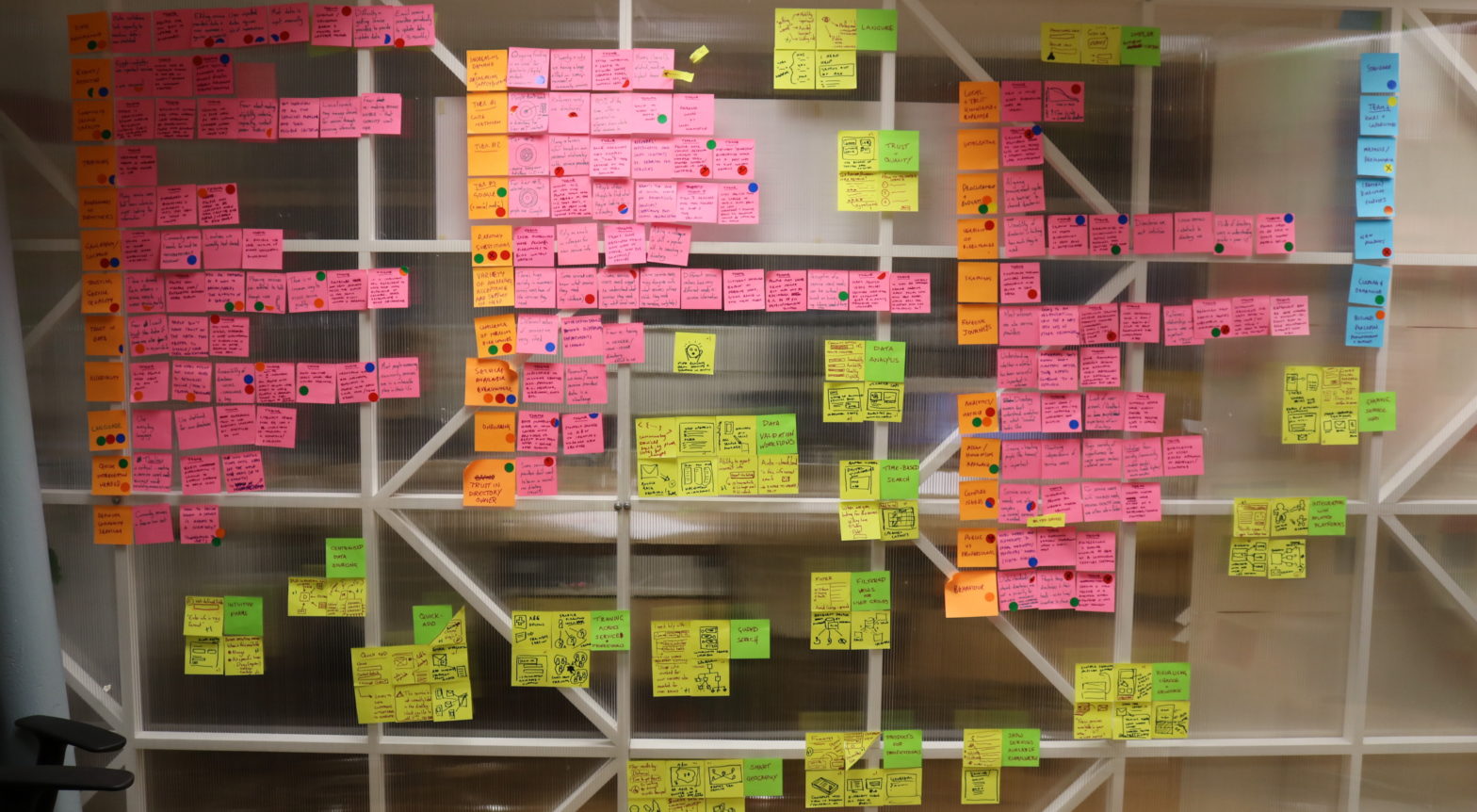By Liv Comberti and Mathew Trivett
Hello!
Welcome to the third round of week notes from the OpenCommunity team. Week notes are a short weekly round up of what we’ve been learning and where we are going next.
Last week we were busy synthesising our research from Adur & Worthing and Buckinghamshire – read on to find out what we learned.
Subscribe to get OpenCommunity week notes delivered to your inbox.
TL;DR *
We turned our research notes into post-its, covered them in colourful dots and sketched concepts. Now we have 180 common themes, 33 categories and 67 concepts. But there may be only 8 themes that a community services standard could meet alone.
* Too long; Didn’t Read – a short summary for busy people.
About the project
OpenCommunity is on a mission to discover the need for a community-services data standard. What might become possible if all community directories in the UK were designed in a way that allowed them to talk to each other?
For more information read the original proposal from the OpenCommunity team.
Question(s) of the week
Who are we building service directories for anyway? Who do we think is using them? And how do we know if they are useful?
(Spoiler alert: it’s worth checking if they actually are.)
What we’ve done
Last week we read through our research notes and listened back over the 28 conversations we had with people in Worthing and Aylesbury to spot patterns and opportunities. From this we identified around 180 common themes(!), and clustered them into 33 top-level categories.
We recognised early on in our research that a data standard can’t solve everything. We worked through each theme to consider which challenges might be met through a common standard, and which needed to consider other factors – such as new business models or improved directory products. We then sketched out a total of 67 initial concepts in response to our themes that we could mock up and test with users.
To explore that analysis in detail you can read our synthesis spreadsheet. From next week, we will also share our findings on the user research library. Feel free to take a read, comment and ask questions.
Otherwise, check out highlights from what we learned below.
What we’ve learned
You may recognise some of the themes in our synthesis from our last week notes.
It would be overkill to discuss each theme in turn, so we’ve pulled out a few of our highlights. It’s interesting to note that of the 180 themes we spotted, we think only 8 could be met solely through a standard.
Timeliness is key
A speedy intervention was mentioned by several as a priority. At Turning Tides, one member of staff mentioned:
“If we can get someone off the street within the first week of being homeless, our success rate is pretty good. The effects of rough sleeping mean people can spiral out of control really quickly, and so after that they could be there for years.”
Street Outreach Worker, Worthing
With waiting lists, difficult to find services and hoops to jump through to find someone who can help, it seemed that each bounce to a new service provider exponentially increased the cost of providing care and support to that individual.
National service providers
National service providers, including phone lines and online chat services provide a challenge to localised directories. National providers are being asked to submit their information in different formats to many local directories. Some aren’t listed at all, and some directories, which list results by location, struggle to display services available ‘everywhere’.
“It’s really hard to get national organisations to create their records. Some have created a page and put the basic information in. Some won’t register with us. RNIB are on, but that’s rare for a large organisation.”
Data custodians, Buckinghamshire County Council
Big effort, little reward
The burden of updating information is generally placed on providers, who are over-stretched for time, resources and tech know-how. Whilst undoubtedly providers have the most up to date information about their services, directories don’t currently provide a sufficiently useful channel for finding new clients. As services and programmes change with funding, a significant effort is required to keep directory listings up to date. Big effort for little reward.
“Lots of smaller organisations don’t have the overheads and size to share information about themselves. We have a funding platform we ask community initiatives to add their information to. But it’s asking for more than it used to, so people have struggled. Lots of pages to fill in, lots of stages. If they’re doing a small project or not good at using computers, it’s quite alienating.”
Community Works, Worthing
Experienced staff don’t need directories
We found that those who had been in their role for many years typically didn’t need directories. They already knew most services they needed to refer people to. The rest were so niche that Google was often faster and more reliable than turning to a directory. Last week we talked about the three referral tiers. Experienced staff seem to carry a “database in their head” of services and contacts in both tiers 1 and 2.
“You stick to what you know, if you’ve built up a relationship with them. It’s tricky but you go with what you know, what’s worked well with other families”
Frontline family worker, Adur and Worthing
Existing directory providers have a lot to answer for
The usability of the directories we saw left a lot to be desired, and unquestionably had an affect on their rate of adoption. Although most directories offer affordable software, the staff time involved in wrestling manual updates and driving adoption mean that running costs are effectively much higher.
No one seems to have thought about what success looks like
Whilst most directory owners we spoke to used analytics, none appeared to have the confidence or time to invest in measuring success. Similarly, whilst huge efforts were made to keep directories up to date, we sometimes had the sense that directory teams weren’t clear on who directories are for and whether they are actually using them.
Legal obligation vs user need
Local councils are legally obliged to provide service information and advice for families, adults with care needs and people at risk of homelessness. However, should we question whether current directory products really meet the user needs these laws were created to address?
In response to those challenges, we had a first pass at sketching possible solutions
Some of these may offer solutions, others we hope will spark deeper conversation. We hope to test them out with users over the coming weeks. You can view a full summary of our ideas in the synthesis document.
Data validation workflows
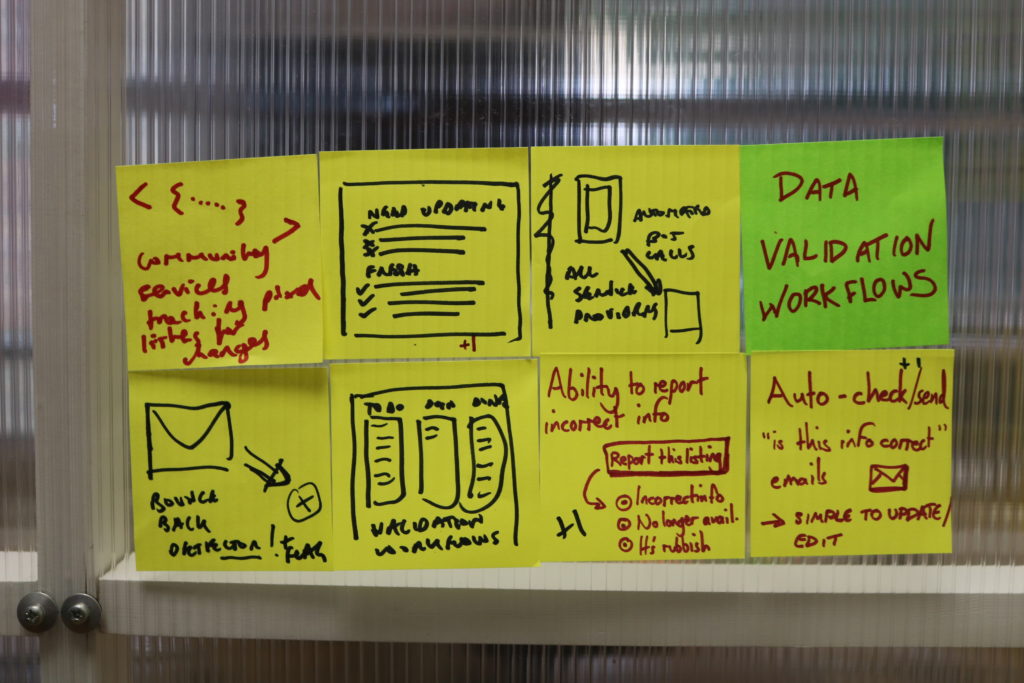
Tools to simplify the validation of service data. Including embeddable tracking code to monitor website changes, tools to flag and report incorrect data, a data custodian interface and checklist to validate and update records.
Quick-add service data
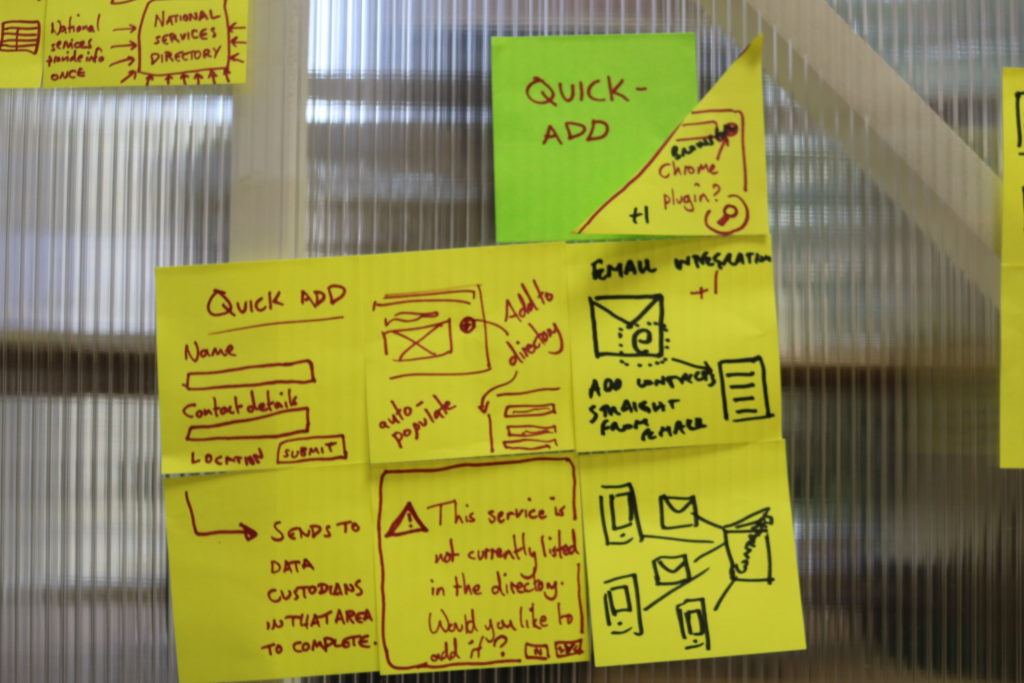
Overcoming the time it takes for providers to add their information by making it simpler for services to be added to the directory. Including quick-add widgets, email integration and mini-forms to capture basic information.
User-led triage and search discovery
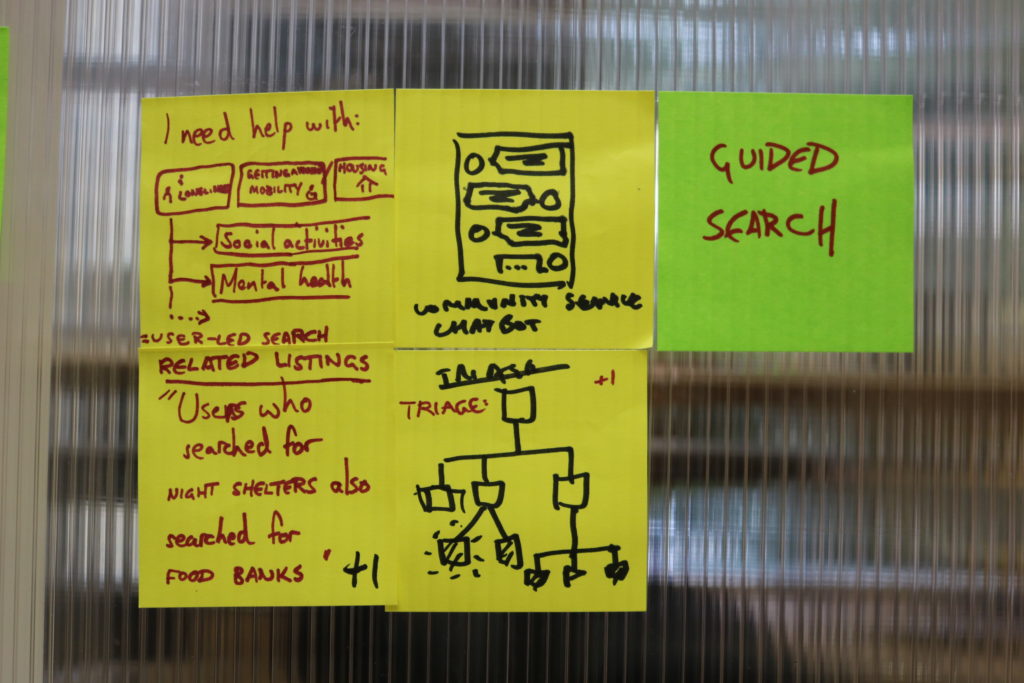
User friendly triage to discover appropriate services. Including a chat bot, guided search and related listings.
Contacts finder products for professionals
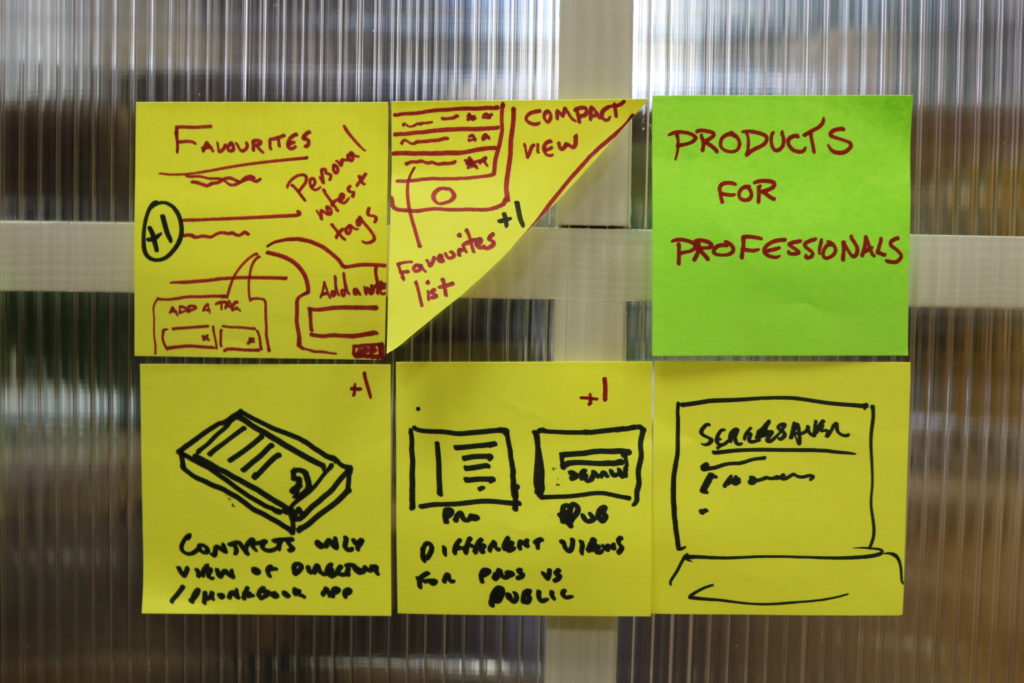
Providing compact, simple views of key contacts for professionals. Meeting tier one needs, whilst also keeping this information up to date.
Intuitive forms
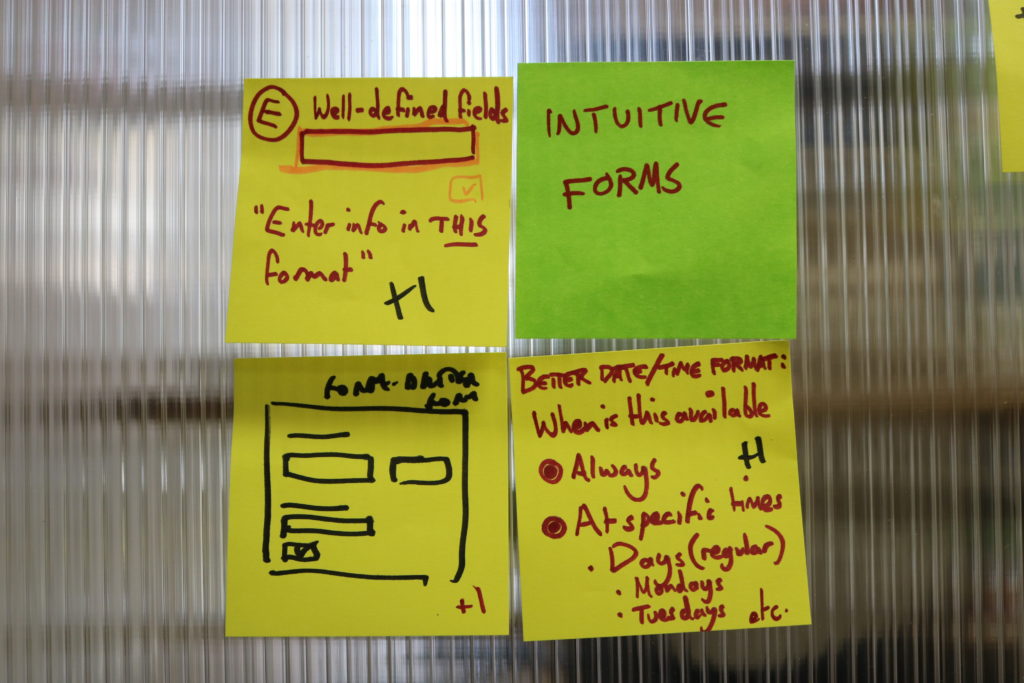
There’s a lot we could learn from the GDS design system regarding the forms through which service providers input information about their services.
Centralised data sourcing
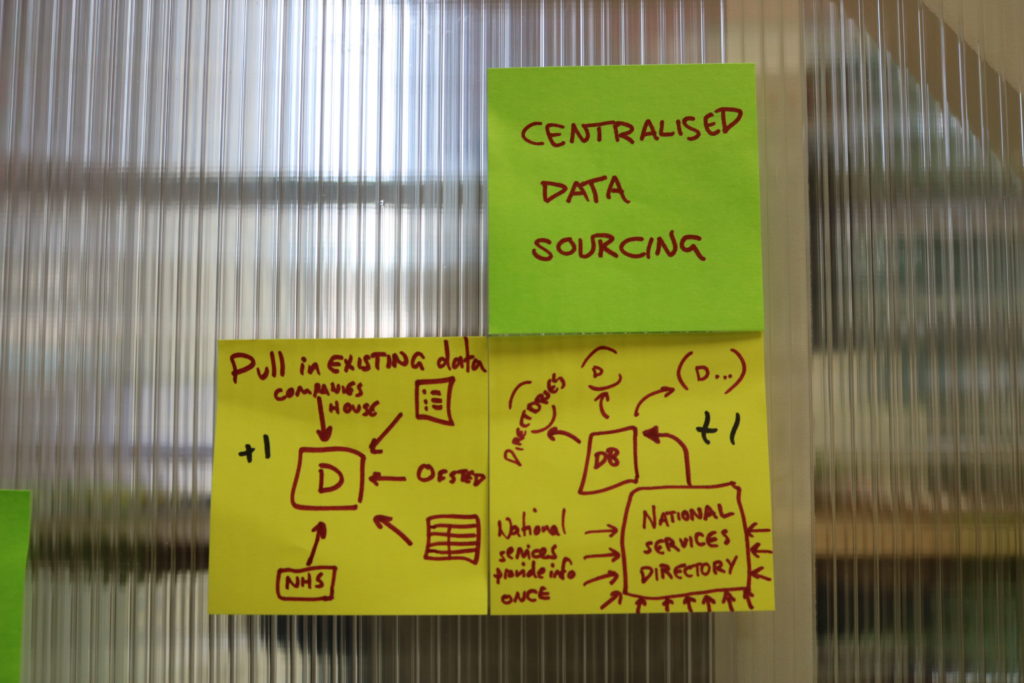
Pulling in data from trusted sources and national providers means they could update once and list their services everywhere.
What we’re up to next
Next week we’re continuing our user research in Devon* where we’ll be meeting adult social care and NHS commissioners, the folks behind the Pinpoint directory, Colab Exeter (a collaborative hub of health & wellbeing organisations) and Exeter public library.
Stay tuned next week to find out what we learned.
*actually we just left – we’ll get back on track with writing these weeknotes next week!
Thanks!
Thanks to everyone we spoke to in Worthing and Aylesbury for all your support and the generous time you gave us. Including Rhian for doing an amazing job at connecting us to people, Ryan at Turning Tides for letting us hang out all morning, Carl and Georgina for giving us hope in humanity, Citizens Advice for letting us steal them away from the frontline for 30 minutes, Liz, Ryan and Della in Bucks for letting us ask super geeky questions about your spreadsheets, Lianna and Eleanor for making us feel much less afraid of the prospect of getting old, and also Mel, Paul, Maddie, Lee, Ben, Karen, Simon, all the James’ and everyone we met at Turning Tides. It’s been a pleasure meeting you all!
